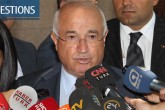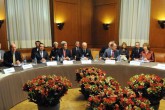During his address in the Southeastern province of Diyarbakır on August 12, 2005, Prime Minister Recep Tayyip Erdoğan said, “The Kurdish question is not the issue of a part of the nation but is the issue of the entire nation. Therefore, as the Prime Minister of this country, I am saying to those who say, ‘what will happen to the Kurdish question?’, that the issue is my issue before anyone else.” With this, he had blazed a trail in the history of the Republic. Following a long period when it was impossible to name and discuss the problem even at the rhetorical level, for the first time, a Prime Minister was explicitly contending the issue so openly and expressly.
Erdoğan was coming from a social sect that had suffered from being regarded as the “Islamic threat,” one of the red lines of the establishment; therefore, his lash-out in 2005 turned more meaningful. Simply, an “other” was setting his hand to the problem of the “another” from the system’s perspective. In this way, the Kurdistan Workers’ Party (PKK) leads those who least comprehend what Erdoğan is trying to do. That is to say, the Kurdish political movement and the PKK met the “Erdoğan momentum” almost with neglect albeit the establishment overtly had realized it. This indifference continued after 2005 in the face of all the “first-ever” steps taken by Erdoğan in the Kurdish question.
Shortly after, as Turkey was steering towards the chaotic political atmosphere of 2007, the PKK could not help itself but resort to violence and provide support to the tutelary centers that they needed. Eleven people died on September 13, 2006 in a bomb attack by the PKK in Diyarbakır. Twelve soldiers lost their lives as a result of the Dağlıca raid by the PKK on October 21, 2007.
The opportunity missed in 2007
On the one hand, the Justice and Development Party (AK Party) was grappling with the process of presidential elections while struggling with the military and judiciary tutelary centers in the street and in politics; and on the other hand, it was struggling with the nationalist social pressure created by the PKK terror. In the same period, not only the PKK terror but also the leading figures of the Democratic Society Party (DTP) were successively issuing statements and penning down articles “winking at Kemalism”. As a consequence of the rising nationalist wave and heating tutelary centers, especially in the aftermath of the Dağlıca attack, the AK Party government had to organize another cross-border military operation on April 20, 2008 in Northern Iraq where over 20 operations had been held previously.
In that period, the plans to have close ties and cooperation with the Iraqi Kurdistan Regional Administration (IKRA), in particular, were postponed and Massoud Barzani was almost turned into a “demonized figure”. In the same period, the PKK targeted civilians again – just a few days before the closure case against the AK Party was filed – and killed 18 people in a bomb attack in Güngören neighborhood in Istanbul. The PKK terror continued without slowing down in the upcoming months. Fifteen soldiers were killed by the PKK at the Aktütün military guard-post in Şemdinli on October 3, 2008. Despite the acts of the PKK, which did everything in their power to project the Kurdish question simply as a terror problem, a key political development could not be curbed.
The AK Party getting rid of the burden of the closure case began to give the signs of future steps for democratization and of efforts to find a political solution to the issue in 2009, and the “Initiative Process” was launched. The 2009 Initiative Process was torpedoed by the PKK again in the Reşadiye attack and the process was frozen substantially. During the 2010 Constitution Referendum, the PKK-Peace and Democracy Party (BDP) line could not help itself but swirl into the most troublesome political position possible agains
In this article
- Foreign Policy
- Opinion
- 2005
- 2006
- 2007
- 2008
- 2009
- 2010
- bdp
- Diyarbakır
- Elections
- Iraq
- Islam
- Islamic
- Kemalism
- Kurdish Community
- Kurdish Question
- Kurdistan Workers' Party Terrorist Organization (PKK)
- Masoud Barzani
- Middle East
- Northern Iraq
- PKK - YPG - SDF - PYD - YPJ - SDG - HBDH - HPG - KCK - PJAK - TAK - YBŞ
- Prime Minister
- Recep Tayyip Erdoğan
- Red Line
- Terror
- The President of the Republic of Türkiye
- Turkish President
- Türkiye's Justice and Development Party | AK Party (AK Parti)


